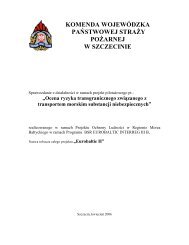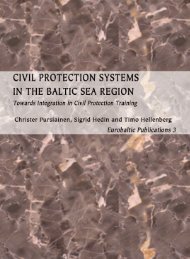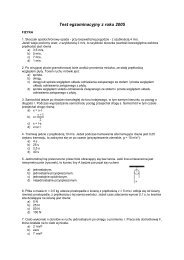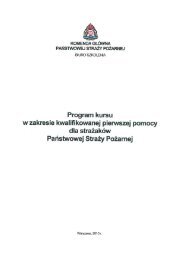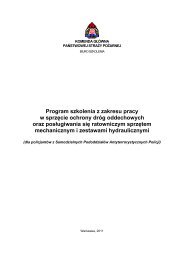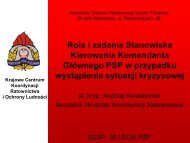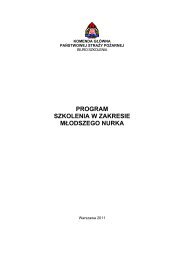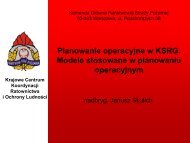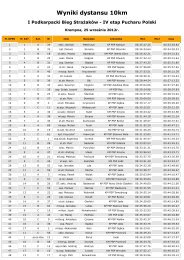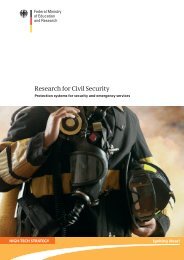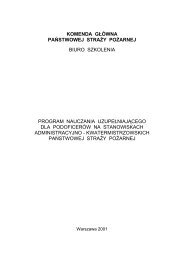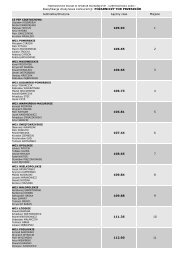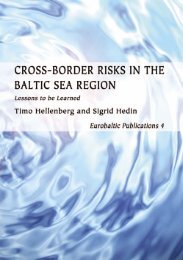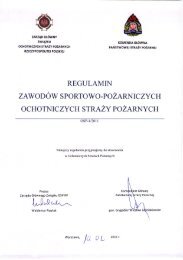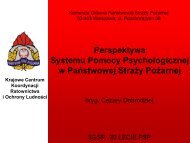Towards a Baltic Sea Region Strategy in Critical ... - Helsinki.fi
Towards a Baltic Sea Region Strategy in Critical ... - Helsinki.fi
Towards a Baltic Sea Region Strategy in Critical ... - Helsinki.fi
Create successful ePaper yourself
Turn your PDF publications into a flip-book with our unique Google optimized e-Paper software.
CHAPTER IV: OIL TRANSPORTATION AND MARITIME SAFETY<br />
affects more than one country by creat<strong>in</strong>g potential or actual losses across<br />
governmental borders (Hellenberg and Hed<strong>in</strong> 2006, p. 8).<br />
Excessive environmental risks<br />
The narrow and shallow geographical conditions of the Gulf of F<strong>in</strong>land sea area<br />
make it a high-level risk zone. The traf<strong>fi</strong>c volume is high its central parts, <strong>in</strong><br />
<strong>in</strong>ternational water, where the lanes of ‘the motorway of the seas’ are located.<br />
Despite the heavy use of the sea as a transport route, the Gulf of F<strong>in</strong>land is not<br />
seen solely as a traf<strong>fi</strong>c route, but as an area of important cultural heritage and<br />
environmental value.<br />
The <strong>Baltic</strong> <strong>Sea</strong> is environmentally vulnerable and has been identi<strong>fi</strong>ed as the<br />
Particularly Sensitive <strong>Sea</strong> Area (PSSA) by International Maritime Organization<br />
(IMO) <strong>in</strong> 2005: “A Particularly Sensitive <strong>Sea</strong> Area (PSSA) is an area that needs<br />
special protection through action by IMO because of its signi<strong>fi</strong>cance for<br />
recognized ecological or socio-economic or scienti<strong>fi</strong>c reasons and which may be<br />
vulnerable to damage by <strong>in</strong>ternational maritime activities.” This means for<br />
example, that the estimation for the renewal of the water of the <strong>Baltic</strong> <strong>Sea</strong> is<br />
approximately 25-20 years, which causes pollutants to rema<strong>in</strong> <strong>in</strong> the water for a<br />
long time.<br />
Even if there is common understand<strong>in</strong>g that on a daily basis most of the<br />
pollution <strong>in</strong> the <strong>Baltic</strong> <strong>Sea</strong> is derived from the surround<strong>in</strong>g land areas, a rout<strong>in</strong>e<br />
ship operation <strong>in</strong>flicts pollution too. For example, WWF F<strong>in</strong>land released a study<br />
accord<strong>in</strong>g to which at present only 13 out of the 50 shipp<strong>in</strong>g companies are<br />
committed to proper treatment of sewage (WWF F<strong>in</strong>land 2007b). All the states at<br />
the <strong>Baltic</strong> <strong>Sea</strong> area are <strong>in</strong>cluded except the Russian Federation.<br />
Despite the shared will of all the <strong>Baltic</strong> <strong>Sea</strong> States to protect the <strong>Baltic</strong> <strong>Sea</strong>,<br />
there are differences <strong>in</strong> how the countries’ representatives perceive and value the<br />
state of the environment of the <strong>Baltic</strong> <strong>Sea</strong>, and why its protection is considered<br />
important. Estonia’s worries about an oil accident are understandable, because<br />
Estonia currently lacks equipment to collect spilt oil from the sea. Then aga<strong>in</strong>, the<br />
country to suffer most from an oil accident would probably be F<strong>in</strong>land, s<strong>in</strong>ce the<br />
prevail<strong>in</strong>g w<strong>in</strong>ds and sea currents <strong>in</strong> the Gulf of F<strong>in</strong>land area would divert oil<br />
pollution to the F<strong>in</strong>nish archipelago and the long F<strong>in</strong>nish coastl<strong>in</strong>e. In addition,<br />
despite what magnitudes of oil pollution combat<strong>in</strong>g equipment a country or region<br />
possesses, the consequences of a 100,000 ton oil tanker accident, if all of the oil<br />
were to be released, would be devastat<strong>in</strong>g for the whole Gulf of F<strong>in</strong>land and the<br />
<strong>Baltic</strong> <strong>Sea</strong> <strong>in</strong> general. At least one aspect of the Russian view comes from the fact<br />
that even if it has signed, it has not rati<strong>fi</strong>ed e.g. the convention regard<strong>in</strong>g the<br />
environmental protection of the <strong>Baltic</strong> <strong>Sea</strong>, the so-called “Espoo Convention on<br />
Environmental Impact Assessment <strong>in</strong> a Transboundary Context” from 1991 (EC<br />
EIA 1991).<br />
A speci<strong>fi</strong>c high-level risk: W<strong>in</strong>tertime ice conditions<br />
Oil transportation has to be guaranteed all the year round and their importance is<br />
highlighted <strong>in</strong> w<strong>in</strong>ter, when weather conditions are at their most challeng<strong>in</strong>g. The<br />
Gulf of F<strong>in</strong>land freezes each year, which demands a special design and<br />
construction of the vessels <strong>in</strong>tended to sail <strong>in</strong> the <strong>Baltic</strong> all the year round.. Tanker<br />
traf<strong>fi</strong>c is faced with the challenges caused by the ice thickness, as well as the<br />
NORDREGIO REPORT 2007:5 151



